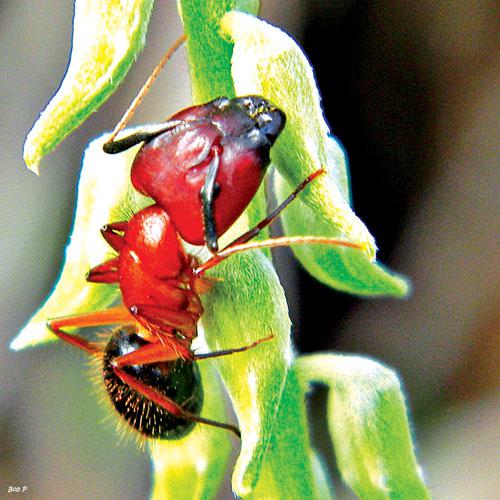Phuket Gardening – A fly in the ointment

PHUKET: Insects are one of the most successful forms life has taken on earth. There are as many as 1,800,000 different species, probably more. And there is no shortage of them here in Phuket. Any self-respecting gardener will be aware of these “critters”: they lurk everywhere in our carefully tended flower beds, shrubberies and vegetable plots. And they are a mixed blessing. While many pollinators such as bees are beneficial both to the environment and to humans, others are pests, especially those that bite or sting, or worse, transmit diseases.
In this regard, public enemy number one is the mosquito which has acquired extra publicity and menace in Thailand because one species, aedes aegypti, a large striped species, is a vector for dengue fever.
Reported figures of dengue here in Phuket have risen sharply to nearly 2000 cases in the past year. Almost certainly, this increase is related to heavy rains and the existence of casual puddles of water favored for breeding purposes by aedes. Oddly, malaria, which is the world’s leading killer, (two million annually, especially of the young), is virtually unknown in the Kingdom.
But even mosquito or midge bites are unpleasant enough, the more so if you are allergic to them. The female anopheles mosquito is the most common bloodsucker, (the male feeds harmlessly on pollen) needing the transfusion to provide sustenance for eggs which she will later deposit in water. Having pierced the host’s skin with her sharp proboscis, she injects an anti-coagulant saliva which allows the blood to flow more easily. It is this fluid which dilates our capillaries, and causes both the swelling and subsequent irritation.
As gardeners, we can take precautions. Ensure that any standing water (fish or lily ponds, or lotus pots), actually contain fish. Even small varieties such as guppies or sword tails will immediately gobble up any eggs or larvae. Other natural predators include insect-eating birds and large insects such as dragon flies, spiders and praying mantises. Try to avoid gardening in the early morning or before sunset when “mozzies” are on the prowl, and avoid areas of deep shade where they hide. Wear a repellent on exposed skin: DEET is effective for several hours and though less potent, natural products based, for example, on citronella, eucalyptus oil or neem, are a useful deterrent. Enclose feet and ankles: the levels of CO2 which attract the insects are higher in these areas of the body.
If mosquitoes are enemy number one for the gardener, others can prove equally, well, irritating. Take ants. They are ubiquitous and indestructible, having colonized every part of the globe bar Antarctica. Here in the tropics, they bite with their mandibles and sting, especially the aggressive weaver ants that create leaf nests in trees, or the large black ants that breed underground or in saucers at the base of flower pots. Typically, the sting is caused by the ant spraying formic acid; after a massed attack by red ants, one can smell it on the skin.
What makes ants more of a problem, is that they are, unlike mosquitoes, social creatures – with colonies which they protect so effectively that they have few natural enemies. Even spiders will not venture near these fortresses manned by soldier ants. But their principal nuisance for the gardener is their capacity to forge relationships with other creatures such as aphids and mealybugs. These tiny insects feed destructively on plant sap and produce a sweet substance called honeydew which is “milked” by the ants. In a symbiotic relationship with the ants, these sap-suckers are protected from predators such as ladybirds. Plants weakened by such attacks often develop fungal diseases or die.
Oddly, neither mosquitoes nor ants are top of the most feared or hated insect list. That dubious honor goes to the spider. Perhaps because there are many venomous species of spiders. But in Phuket they are the gardener’s ally, consuming mosquitoes and other flying nasties ensnared by their webs. Nonetheless, it has been estimated that up to 50 per cent of women are arachnophobic. It seems that the fear of spiders runs deep in many of us.
Tip of the week – Leaf coloration
Foliage plants, grown principally for their leaf color, need the right conditions to display their best and brightest hues. Popular, broad-leaved cordylines such as fruticosa, only attain that rich magenta hue when given plenty of sun, though over-exposure to noon-day glare may, as with shade-loving species, lead to leaf scorch.
Older forms of euphorbia cotinifolia, with hybrids such as atropurpurea now available in glowing shades of crimson, will only produce red foliage in a sunny location.
The reverse is also true of some plants. Some rainforest plants or those unused to high levels of heat or humidity, may change their color in tropical conditions. Some bromeliads, especially red leaved ones or those with a scarlet inflorescence, may revert to plain green at sea level, but regain their coloration at cooler, elevated altitudes.
Brugmansias grow wonderfully well in the highlands of Southern Spain or Chiang Mai, but struggle here in Phuket.
If you have a question, or a garden that you would like featured, you can email Patrick Campbell here.
Keep checking our online Phuket Lifestyle pages, follow us on Twitter @phuketgazette or join our Facebook fan page for regular gardening features and tips.
— Patrick Campbell
Latest Thailand News
Follow The Thaiger on Google News:


























